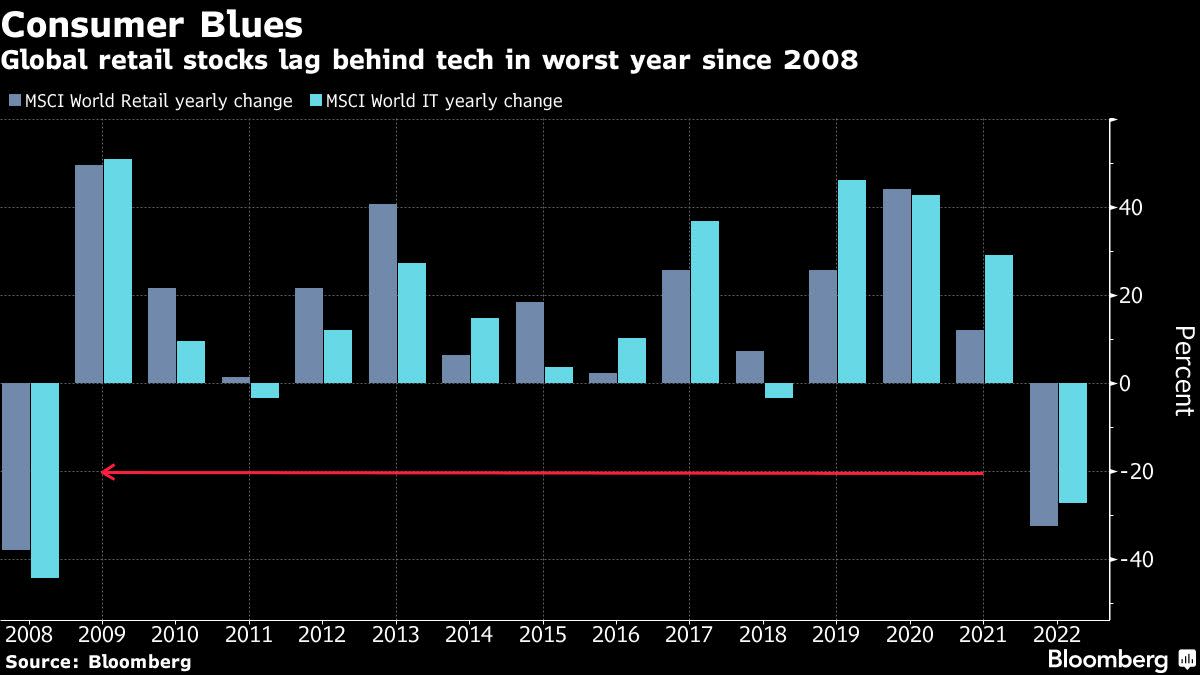If You Thought the Tech Rout Was Bad, Spare a Dime for Retailers

(Bloomberg) — For all that the slump in technology stocks has headlined a treacherous year for global equity markets, there’s one sector that’s faring even worse.
Most Read from Bloomberg
The MSCI World Retailing Index, which includes the likes of Target Corp., Zalando SE and Amazon.com Inc., is on track for its first negative year since 2008. The gauge was down about 29% in 2022 through Thursday, surpassing even the 24% decline of the MSCI World Information Technology Index.
The same inflation worries that have sent shivers through tech stocks are also taking a toll on retailers, leading to a squeeze on disposable incomes and pushing up costs of everything from transportation to labor. Warnings from behemoths like Walmart Inc. and Target have shaken investors, and many analysts say they may not be the last.
“We are at the beginning of an inflationary spiral,” said Alasdair McKinnon, chief investment officer of Sgurr Ventures, speaking before Friday’s data showing an unexpected acceleration in price gains in the US. “This squeeze in consumer incomes has come as a surprise to many investors.”
Take Target, whose profit warning on May 18 sent the stock down 25%, the biggest one-day drop since the Black Monday crash of 1987. What’s worse, just three weeks later the US retail giant cut its outlook again — one that raises worries of a fast-deteriorating consumer environment.
Walmart, meanwhile, said this month that it needs another two quarters or so to work through an inventory surge that prompted markdowns and contributed to May’s 16% decline in the retailer’s stock.
Cautious tones were also broadcast by several apparel retail companies including Abercrombie & Fitch Co., American Eagle Outfitters Inc. and Gap Inc. And after one of the worst first-quarter earnings seasons in recent memory for apparel names, there may be more misery to come.
Just The Start
“We’ve only really had one quarter of negative surprises,” said John Zolidis, founder of Quo Vadis Capital. “Normally in a recessionary cycle there will be several rounds of cuts before the outlook and stocks bottom. Unless we see a reversal of inflation data and a less hawkish approach from the Federal Reserve, our guess would be that we’re closer to the beginning of the pain than the end of it.”
Don’t just take his word for it though. According to the most powerful person in the banking industry, JPMorgan Chase & Co.’s Jamie Dimon, an economic “hurricane” is on the way.
“Investors are worried about every datapoint pointing to further incremental inflation,” said Michel Keusch, a fund manager at Bellevue Asset Management. “The wake-up call started with the comments from Walmart and Target, and since then we have seen many retailers warning, adding to the general pessimism.”
While such concerns have been reflected in reduced valuations this year, retail stocks still aren’t cheap. The MSCI World Index’s retailing subgroup remains more expensive than the main benchmark in terms of forward price-to-earnings ratios, due in large part to the presence of richly valued online merchants such as Amazon.com and Zalando.
Meanwhile, short sellers are seeing an opportunity, seeking to sell borrowed stock and buy it back for less. Pet products retailer Chewy Inc. and Swedish fashion chain Hennes & Mauritz AB are among the most shorted stocks in the sector, with average short interest rising to 5.4% of free float for the MSCI retail subgroup, from 3.5% in January, according to IHS Markit data.
UK Selloff
With inflation and living costs rising pretty much everywhere, few stocks are immune. In the UK, where power bills are surging and consumer confidence plunging, the likes of Next Plc, Marks & Spencer Group Plc and online fashion retailer Asos Plc have seen a sharp selloff.
In Asia, the sector is meeting a similar fate, with the Bloomberg Asia Pacific Retail Index down 20% this year and bellwether Australian retail-chain operator Wesfarmers Ltd. falling 26%.
There are some outliers. Sat Duhra, a portfolio manager at Janus Henderson Investors, says the quality domestic consumer names in China are beginning to appear attractive after a deep correction.
To be sure, not everyone is tightening their purse strings with some consumers still prepared to spend lavishly. Airlines bookings are surging, while luxury spending hasn’t fallen in the same way it did in 2008.
Retailers known for offering big discounts are also doing well as lower income households seek cheaper alternatives. T.J. Maxx owner TJX Cos.’ margin performance shone against peers, while discount-store operators Dollar Tree Inc., and Dollar General Corp. saw their shares rocket in one day after their sales both beat analyst expectations.
History Lesson
“It can seem hard to reconcile comments from Walmart on some consumers trading down in lunch meats due to inflation with those from Remy-Cointreau seeing healthy momentum for its Louis XIII cognac,” said Swetha Ramachandran, a portfolio manager at GAM Investments.
As if investors weren’t nervous enough already, they also have history against them: The MSCI World Retailing index’s previous annual declines — 2008, 2007, 2002 and 2000 — all came around recession years.
“We’re conscious of increasing our exposure to consumer discretionary as a segment overall, and that’s an area that we have been more underweight,” Louise Dudley, portfolio manager at Federated Hermes, said by phone.
Most Read from Bloomberg Businessweek
©2022 Bloomberg L.P.




